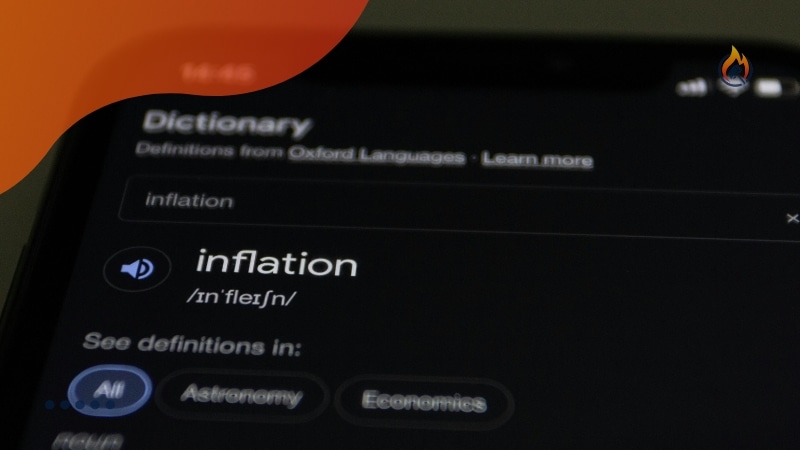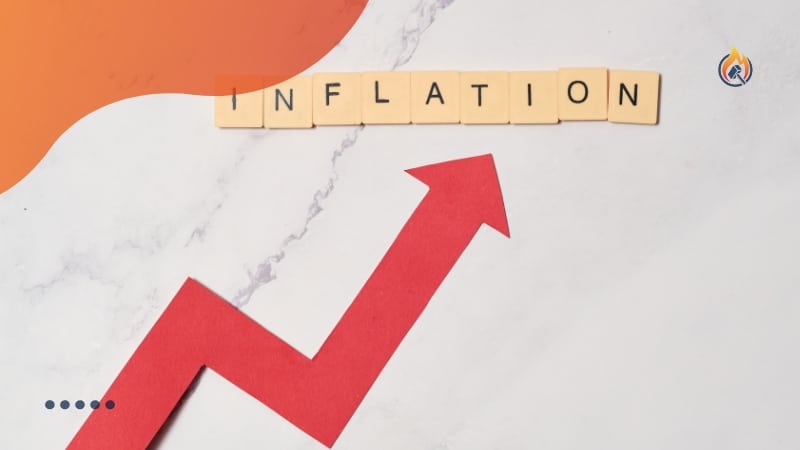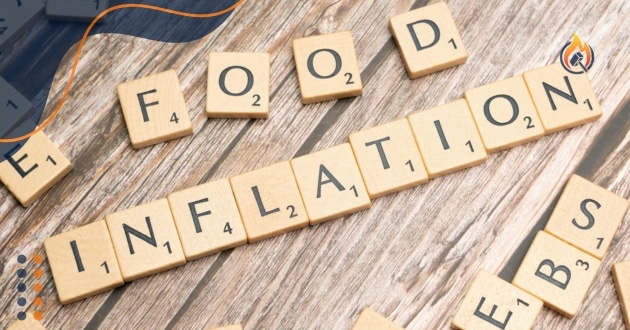Today, we will go further. Obviously, we will explain the impact of inflation on savings, starting with the basics, explaining what inflation is. But we will also help you protect your money. If you apply the strategies presented, you will have a great chance of not having your purchasing power eroded.
Therefore, if you want to know everything about the impact of inflation on savings, you are in the right place. Discover in 05 minutes everything about inflation and, most importantly, how not to suffer from it.
What is inflation and how does it work?

Have you ever wondered why prices rise so unpredictably?
Inflation is not driven by a single cause. In Canada, it results from a combination of supply and demand factors.
First, you must understand cost-push inflation.
It occurs when companies’ production costs increase, even if demand remains the same. Consequently, these costs are passed on to consumers in the form of higher prices.
Think about global supply chain disruptions, such as those that occurred during the pandemic and the War in Ukraine, which caused prices to rise for everything from vehicles to food.
Furthermore, rising raw material prices, such as oil, also create a ripple effect. This then increases transportation and manufacturing costs, and also the final prices of products.
On the other hand, demand-pull inflation is when too many people want a product. When demand for a product or service exceeds supply, prices skyrocket.
An example is the pent-up demand for travel after the lifting of pandemic restrictions, which caused airfare and hotel prices to soar.
The Bank of Canada and its fight against inflation (Impact of inflation on savings)

Amidst this complexity, the Bank of Canada (BoC) acts to control inflation.
The BoC’s primary mission is to keep inflation at its 2% target, with an acceptable variation between 1% and 3%. The most common measure to achieve this objective is the overnight rate.
Basically, when inflation rises, the BoC increases the interest rate. This makes credit more expensive for businesses and individuals, discouraging consumption and investments.
As a consequence, the economy slows down, and pressure on prices decreases.
It is important to note that the BoC does not only consider total inflation.
To avoid overreactions to short-term fluctuations. For example, a temporary rise in gasoline prices. The central bank focuses on underlying inflation measures, such as CPI-trim and CPI-median.
These indices exclude the most volatile components to get a clearer view of long-term price pressures.
6 Strategies to protect your savings
But after all, what to do to protect your money? Action is crucial. This is because leaving traditional savings idle, with low interest rates, means a loss of purchasing power.
The best way to combat inflation is to invest in assets that generate returns above the inflation rate.
As a rule, stocks and commodities have shown greater long-term growth potential, outperforming inflation and increasing your purchasing power. Let’s now look at some ways not to suffer from inflation:
1. Reevaluate your budget (Impact of inflation on savings)
The first step is to understand where your money is going.
Create a detailed budget, separating mandatory expenses (rent, bills) from discretionary ones (eating out, entertainment).
This will give you a clear vision and allow you to identify where to make cuts.
If, from this, you verify that you have little left to invest, don’t worry. There are smart investing on a budget options that help you invest with little money.
2. Pay off expensive debts
Inflation and high interest rates make debt even more burdensome.
Focus on paying off high-interest debts, such as credit card debts.
This not only relieves financial pressure but also frees up capital for saving or investing.
3. Invest to beat inflation
As already mentioned, leaving money idle in a low-yield account is ineffective.
The secret is to find investments that offer a real return – that is, the nominal return minus the inflation rate.
4. Increase your income (Impact of inflation on savings)
While cutting expenses is important, the most powerful long-term strategy is to increase your earning capacity.
Focus on improving your skills. For this, take courses or look for opportunities for salary increases. Tools like LinkedIn help you position yourself in the market, thus achieving good financial results.
In this way, ensure that your income keeps pace with or exceeds inflation, protecting your standard of living.
5. Adjust your grocery shopping habits
Food prices have a large weight in the CPI calculation, so they directly affect your wallet.
Therefore, plan meals, use coupons, and opt for generic brands. By doing this, you will save a lot.
6. Monitor your recurring accounts and subscriptions (Impact of inflation on savings)
In times of high prices, small fixed expenses, such as streaming services or apps you barely use, can accumulate and weigh on your budget.
Review and cancel what is not essential to free up money. However, be careful not to overdo it; keep some that you like. After all, leisure is also important.
Frequently Asked Questions
1. What is the CPI and why is it so important?
The CPI (Consumer Price Index) is the main metric for measuring inflation in Canada.
It tracks the change in prices of a basket of goods and services.
The BoC uses it as the main indicator for making monetary policy decisions. It directly reflects the decline in your money’s purchasing power.
2. Does traditional savings lose value with inflation? (Impact of inflation on savings)
Yes, absolutely.
If the interest rate on your savings is lower than inflation, your money loses purchasing power.
For example, if inflation is at 3% and your account yields 1%, you are losing 2% of your purchasing power annually.
3. Why might inflation in Canada be different from other countries?
Inflation is a global phenomenon, but it is shaped by country-specific factors.
In Canada, dependence on commodities like oil and gas, the structure of the supply chain, and the internal policies of the government and the BoC create unique dynamics.
Especially with decisions in response to global shocks, such as the removal of carbon taxes or interest rate cuts, they differ from the actions of other nations, resulting in changes in inflation.
Conclusion
The impact of inflation on your savings is undeniable. It has the power to erode your financial assets without you realizing it.
But, as we have seen, understanding inflation – what it is, how it is measured, and why it happens – is the first step to protecting yourself.
Far from being an insurmountable problem, inflation is a challenge that can be combated with the right strategies.
From reevaluating your budget and paying off debts to investing in assets like stocks, and increasing your income, these are ways to not suffer from inflation.
The key is proactivity. Don’t wait for inflation to come. Face it with a plan. After all, protecting your financial future is one of the most important things you can do for yourself.


